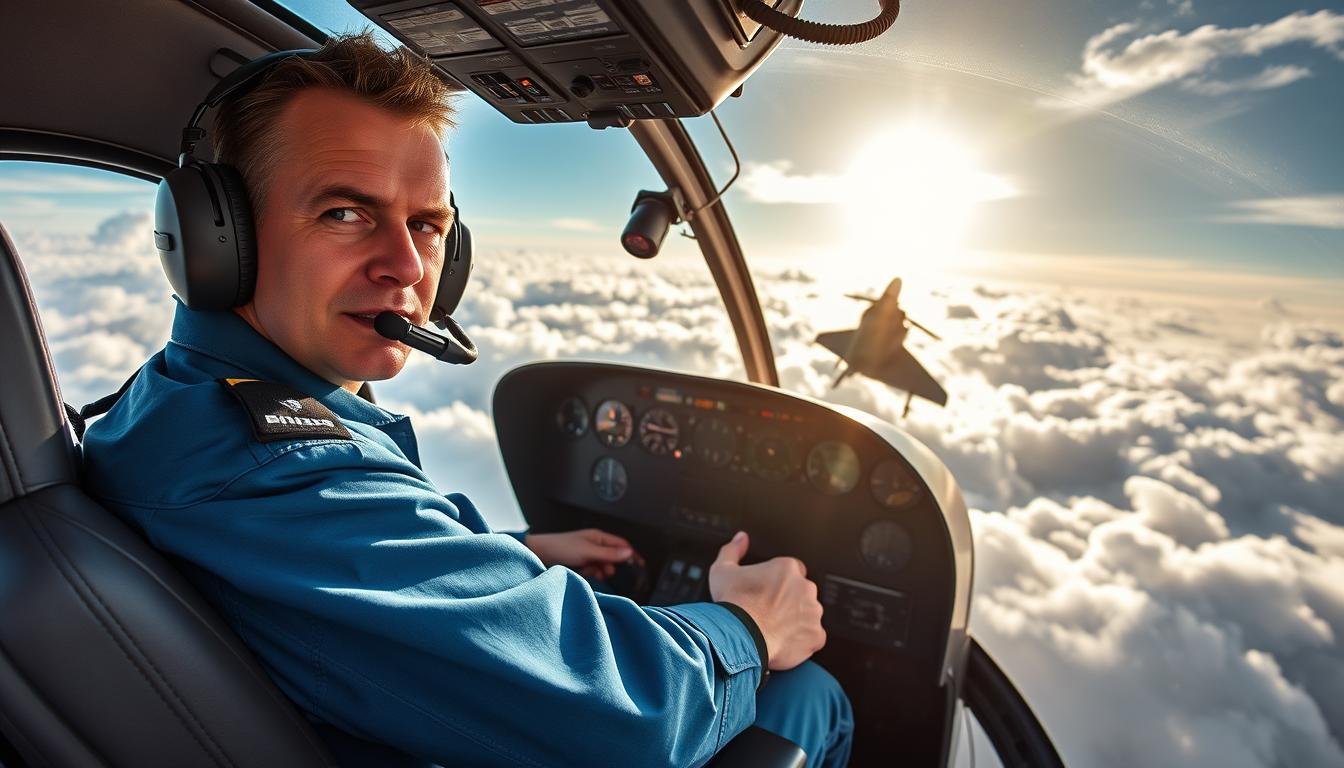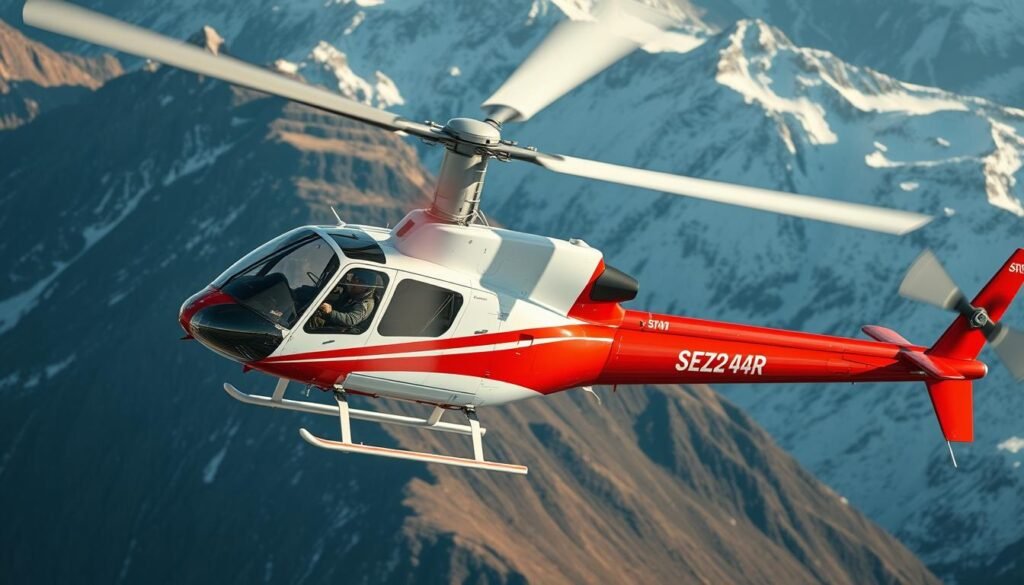One in five commercial flights cites crew coordination issues as a primary human factor—a striking reminder that helicopter pilot skills extend far beyond flying alone. From communication and teamwork to decision‑making under pressure, these abilities are just as critical to safety and success as technical expertise in the cockpit.
Helicopter Pilot Skills demand steady judgment across many tasks. They calculate weight and balance, plan fuel for primary and alternate legs, and verify cargo and baggage against the loadsheet.
Beyond systems and controls, the role requires leading crews and setting clear expectations with people on board. Professionalism ties procedures, checklists, and briefings to mission limits.
Continuous training, frequent simulator refreshers, and regulatory updates keep teams current. Physical fitness, rest discipline, and mental readiness are treated as operational necessities for consistent performance.

Key Takeaways
- Comprehensive Duties: The pilot handles planning, loadsheet verification, and crew coordination as part of routine safety.
- Professional Standards: Checklists and briefings align with mission and aircraft limits.
- Ongoing Training: Simulator sessions and proficiency checks sustain decision-making.
- People Management: Clear communication reduces ambiguity in normal and abnormal operations.
- Fitness and Readiness: Mental and physical health are operational priorities for a lasting career.
Helicopter Pilot Skills: How To Build A Safe, Successful Career
Operational planning begins by matching mission type to crew capability and aircraft performance.
VIP transport, EMS hops, aerial survey work, law enforcement support, and offshore lifts each demand a tailored approach. Crews plan routes that can shift in real time to avoid obstacles, manage airspace, and respect terrain. Flying low exposes teams to rapid weather changes and confined landing spots, so conservative margins matter.
Clear communication with ATC, ground teams, and onboard personnel remains constant. Recurrent training and scenario drills keep decision-making sharp and responses consistent. Standardized briefs define roles, abort points, and contingency triggers before any complex task begins.
They factor aircraft limits, density altitude, and confined-area constraints into every pre-mission check. When conditions change, the team executes measured adjustments rather than rushed improvisation. This approach reduces risk and supports a long, reliable career in United States operations.
Aligning Skills With Real-World Missions And Safety Priorities
- Match mission profile to training and equipment.
- Plan flexible routes and rehearse alternate options.
- Use clear briefs to align expectations and abort criteria.
| Mission Type | Primary Focus | Key Pre-Mission Checks |
|---|---|---|
| EMS Transport | Speedy, safe patient transfers | Weight/balance, med equip, landing site survey |
| VIP Shuttle | Discretion and punctuality | Route flexibility, passenger brief, security coord |
| Aerial Survey / Law Enforcement | Low-level accuracy and coordination | Density altitude, confined-area checks, comms plan |
| Offshore Operations | Performance in limited touchdown zones | Fuel planning, deck interface, weather minima |
For more on handling urgent scenarios and operational pressure, the article on challenges in emergency operations provides practical insights.
Mastering Core Flying Competencies For Everyday Operations
Daily flight work hinges on repeatable technique and split-second responses in unpredictable environments. Crews train to keep control inputs small and accurate so the aircraft stays stable in gusts and rotor wash.

Hand-Eye Coordination And Reflexes For Precise Control
Fine coordination lets a pilot make constant, subtle corrections to attitude, altitude, and heading. These micro-adjustments reduce workload and keep the flight smooth during pickups and inspections.
Situational Awareness At Low Altitude And In Complex Airspace
Pilots must track terrain, wires, and other traffic while planning escape routes. Staying ahead of the aircraft means monitoring power, airspeed, and obstacles at all times.
Hovering, Confined-Area Takeoffs/Landings, And Route Flexibility
- Precise hover and pedal control enable accurate set-downs in tight zones.
- Confined-area departures require strict power checks and stabilized profiles.
- Route flexibility lets crews deviate safely for terrain or weather without losing the mission.
Adapting To Rapid Weather Changes And Varying Terrain
“Reading microclimates and anticipating trends gives teams crucial decision time.”
They validate obstacles and wind indicators with people on the ground and confirm power available before committing near hazards. For detailed performance guidance, crews often consult the Bell 206 training manual.
Communication, Leadership, And Decision-Making Under Pressure
When time compresses, concise communication and decisive command separate safe outcomes from risky ones. Teams rely on a clear chain of command and practiced callouts to keep tasks aligned.

Clear, Concise Radio Communication With ATC And Crews
Standard phraseology reduces ambiguity. Crew members use brief, confirmed transmissions to lock in clearances and synchronize ground and air actions.
Leadership In Crew Resource Management And Delegation
The pilot in command fosters open input while assigning specific roles. Delegation, like navigation cross-checks and approach callouts, cuts individual workload and increases shared awareness.
Rapid, Safe Choices In Time-Critical Scenarios
Quick decisions depend on practiced checklists, memory items, and scenario training. Staying calm stabilizes people and helps the team follow orderly steps when a situation evolves.
- Brief, execute, verify loops keep everyone aligned.
- Modeling procedural discipline supports safe abort decisions.
- Time management ensures critical actions occur in sequence.
| Focus | Action | Outcome |
|---|---|---|
| Radio Calls | Use concise phraseology | Faster, clearer coordination |
| Crew Leadership | Assign roles and encourage input | Shared situational awareness |
| Decision Timing | Follow practiced gates | Safer go/no-go choices |
For a deeper look at essential training and techniques, review essential skills to support ongoing commitment and professional growth.
Training, Learning, And Career Development In The United States
A strong training plan links classroom learning, simulator exposure, and real-world tasks to build reliable judgment. This mix helps pilots move from basic maneuvers to mission-ready performance. It also sets clear milestones for promotion and added responsibility.

Continuous Learning: Simulators, Recurrent Checks, And Regulatory Updates
Modern crews undergo non-stop cycles that include simulator refreshers and periodic checks. These sessions validate core maneuvers and emergency procedures. They also ensure compliance with changing regulations.
Building Experience: Flight Hours, Diverse Tasks, And Professionalism
Gaining experience means pursuing varied missions—tours, utility work, EMS, and offshore operations. Each task refines judgment and adds operational context. Professionalism shows through disciplined planning, accurate logs, and strict SOP adherence.
Cultivating The Right Mindset: Openness, Adaptability, And Commitment
Many control inputs become automatic motor responses. An open, coachable attitude speeds learning more than unrelated background strengths. Commitment to health, study, and preparation keeps a person ready for checks and new aircraft types.
| Focus Area | Action | Outcome |
|---|---|---|
| Simulator Training | Recurrent scenarios and emergency drills | Validated competence and regulatory currency |
| Experience Building | Cross-mission flying and targeted scenarios | Broader judgment and mission-specific ability |
| Mindset & Health | Mental readiness, mentorship, and debriefs | Faster learning and sustained performance |
Safety, Fatigue Management, And Essential Gear For Peak Performance
Multiple short sectors in a single day make fatigue management and reliable equipment essential to safe operations.
Work-Rest Discipline And Fatigue Risk Mitigation
Crew members establish predictable work-rest routines and use objective cues to decide when to delay or decline tasks. They pace time on task, use checklists, and share duties so no one accumulates unsafe fatigue.
Health And Fitness: Mental And Physical Readiness
Hydration, nutrition, and regular conditioning support clear thinking and fine motor control during high-demand phases. Regular recovery windows and sleep hygiene are treated as non‑negotiable parts of planning.

Why A Quality Aviation Headset Matters In Helicopters
Helicopters produce continuous high noise levels, roughly three times louder than airliners. A robust headset reduces hearing risk and preserves communication clarity with ATC and crews.
Headset Features To Prioritize: Noise Cancellation, Comfort, And Audio Clarity
- Active noise cancellation to lower background rotor noise.
- Lightweight design and cushioning to prevent hotspots on multi-sector days.
- Clear audio transmission for confined-area approaches and critical callouts.
Smart Tools And Kits: Navigation Apps, Sunglasses, And Organized Flight Bags
Useful field gear includes polarized aviation sunglasses to cut glare, organized flight bags for quick access to documents, and reliable GPS apps for route planning.
Training investments and quality equipment combine to expand decision time and improve coordination under changing conditions. By integrating disciplined rest, protective gear, and practical tools, pilots keep safety and performance high across varied missions.
Conclusion
Combining varied missions with disciplined routines lets a person turn training into dependable on‑the‑job performance. A helicopter pilot builds a competitive career by pairing core flying mastery with focused learning and disciplined habits.
Pilots who log hours, pursue structured practice, and choose reliable equipment sustain higher performance across flight profiles and helicopters. Practical experience plus a quality headset and organized cockpit tools improves communication clarity and workload management.
The pilot’s ability to adapt, decide, and lead under pressure grows with debriefs and steady practice. Keep rest, fitness, and learning aligned with mission goals. For steps on career development and required training, see how to become a helicopter pilot.
FAQ
What core abilities matter most for a safe, long-term flying career?
A combination of precise hand-eye coordination, solid situational awareness, and disciplined decision-making defines long-term success. Regular training, conservative judgment in marginal conditions, and steady experience accumulation keep performance reliable. Emphasis on crew coordination and clear communication also reduces risk during complex missions.
How can someone build practical competence for low-altitude operations and confined-area work?
Focused training in hovering, confined-area approaches, and slope operations under instructor supervision builds real-world competence. Use simulators to rehearse unusual attitudes, then progress to real flights with incremental exposure to challenging terrain and weather. Repetition, debriefing, and mentoring accelerate safe skill transfer.
What steps improve situational awareness in busy or mountainous airspace?
Maintain continuous visual scanning, cross-check instruments, and anticipate traffic or terrain by planning several steps ahead. Use up-to-date charts, terrain awareness tools, and briefings. Communicate intentions early with air traffic services and teammates to avoid surprises and preserve margins.
How should one communicate under high workload or emergency conditions?
Use short, standardized phraseology, prioritize essential information, and confirm critical items with readbacks. Assign roles during high workload scenarios so one person manages flying while another handles radios and checklists. Calm, concise exchanges reduce confusion and speed resolution.
What leadership behaviors matter during multi-crew operations?
Effective leaders delegate clearly, solicit input, and maintain authority while encouraging crew resource management. They set expectations, monitor workload, and intervene early when errors appear. Demonstrating accountability and structured briefings enhances team performance and safety.
How often should retraining and recurrent checks occur to stay current?
Recurrent checks typically follow regulatory intervals set by the FAA and employers, often annually for some proficiencies and every six months for others. Pilots should supplement formal checks with simulator sessions and scenario practice whenever new equipment or mission profiles are introduced.
What metrics define useful experience when applying for advanced roles?
Employers value total hours, low-level or mountain hours if relevant, instrument time, and mission diversity—such as utility, EMS, or external-load work. Demonstrated decision-making under pressure, consistent training records, and references carry equal weight alongside raw flight time.
How can fatigue be managed during irregular schedules and long duty days?
Enforce strict work-rest cycles, monitor sleep quality, and avoid stimulants that disrupt recovery. Use preflight risk assessments to identify fatigue hazards, schedule high-demand tasks during peak alertness, and apply conservative go/no-go criteria when rest is marginal.
Which health and fitness practices support peak performance?
Regular cardiovascular exercise, strength work for core stability, balanced nutrition, and sleep hygiene all support alertness and control. Routine medical exams and prompt management of mental health concerns preserve fitness for duty.
Why invest in a high-quality aviation headset and what features matter?
A premium headset improves hearing, reduces fatigue, and enhances clear communications in noisy environments. Prioritize active noise reduction, comfort for long flights, reliable audio clarity, and compatibility with aircraft connectors. Durable build and good customer support add long-term value.
What smart tools and accessories aid daily operations and planning?
Use current navigation apps with terrain and weather overlays, polarized sunglasses for glare reduction, and an organized flight bag with checklists and spare batteries. A compact first-aid kit and basic maintenance tools increase readiness on remote routes.
How should a newcomer approach career development in the United States?
Pursue structured training at reputable schools, build varied flight experience, and seek mentorship from seasoned aircrew. Stay current with FAA regulations, invest in recurrent training, and demonstrate professionalism through punctuality, thorough planning, and steady judgment.
What mindset supports continuous improvement and safety culture?
Adopt openness to feedback, willingness to adapt techniques, and commitment to ongoing learning. Prioritize safety over schedule pressures, report hazards, and participate actively in safety briefings. A humble, disciplined approach fosters long-term career resilience.kills and staying current with training and certifications, pilots can excel in any flying environment, from private aviation to critical commercial operations.
Related Articles
- Women in Helicopter Aviation: Breaking Barriers and Building a Career
- Freelance Helicopter Pilots: How to Build a Successful Career
- Helicopter Pilot Licensing Requirements: A Global Overview
- How to Network and Advance Your Career as a Helicopter Pilot
- What to Expect in Your First Year as a Commercial Helicopter Pilot
More from This Category
- Work-Life Balance for Helicopter Pilots: Managing a Demanding Career
- How to Transition from Fixed-Wing to Helicopter Flying: Tips for Pilots
- The Best Industries for Helicopter Pilots: Job Opportunities Beyond Passenger Transport
- Medical Requirements for Helicopter Pilots: What You Need to Know
- How to Build Flight Hours as a New Helicopter Pilot
- Essential Skills Every Helicopter Pilot Needs to Succeed
- Top Helicopter Pilot Training Schools: How to Choose the Best Program
- Private vs. Commercial Helicopter Pilot: Which Career Path Is Right for You?
- Helicopter Pilot Salary: What You Can Expect at Every Stage of Your Career
- How to Become a Helicopter Pilot: A Step-by-Step Guide



